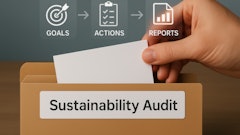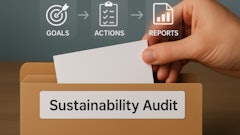
In today’s business landscape, sustainability is no longer a buzzword, it’s a corporate imperative. As environmental consciousness grows among consumers, brands are under increasing pressure to align their operations with environmental, social, and governance (ESG) standards. One of the most powerful areas for ESG transformation lies within supply chains, especially those that are outsourced. With e-commerce exploding across global markets, supply chain efficiency has become critical, but so have transparency and responsibility.
Outsourcing supply chains may offer cost and scale advantages, but it also increases the risk of reduced visibility and compliance. That’s why sustainable sourcing must become a strategic priority, not just to meet regulations, but to future-proof businesses in a competitive, digitally driven marketplace.
Why supply chains matter for ESG
For most companies, the supply chain is the largest contributor to environmental and social impact. From carbon emissions during transportation to working conditions in remote factories, each node of the supply chain presents both a risk and an opportunity. Particularly in e-commerce, where speed and cost-effectiveness are paramount, supply chains can stretch across continents and vendors, making sustainability harder to track but more important than ever.
When companies outsource these operations to third-party manufacturers or logistics providers, especially in developing regions, they must ensure that ESG principles remain intact. If not, they risk more than just reputational damage; non-compliance can invite regulatory penalties, shareholder criticism, and consumer backlash.
Embedding sustainability into outsourced supply chains
1. Define clear ESG criteria
The first step to ensuring sustainable sourcing is clarity. Businesses must define what sustainability means in measurable terms, whether it's reducing carbon emissions, sourcing ethical raw materials, eliminating single-use plastics, or ensuring worker safety and fair pay. These benchmarks should be included in contracts and communicated during onboarding.
2. Partner selection with purpose
Every outsourcing decision must include ESG due diligence. Companies should assess potential vendors based on their environmental practices, labor policies, and governance structures. Certifications such as ISO 14001, B Corp status, or Fair Trade can serve as starting points. However, real assurance comes from on-the-ground audits, third-party monitoring tools, and live compliance dashboards.
3. Long-term supplier collaboration
Instead of treating suppliers as transactional vendors, companies must foster long-term, value-driven relationships. Co-creating sustainability roadmaps, investing in vendor training, and sharing tools or best practices can elevate supplier capability and performance. This collaborative model leads to shared accountability, where both parties are working toward mutual ESG goals.
Leveraging technology for supply chain transparency
Technology has become the greatest enabler of sustainable sourcing. From AI-driven forecasting to blockchain-backed traceability, digital tools are transforming how businesses monitor and manage their outsourced supply chains.
1. Blockchain for traceability
Blockchain offers immutable records, which means that every stage of the supply chain from raw material origin to last-mile delivery can be logged, verified, and audited. For industries like fashion, pharmaceuticals, and food, this level of traceability is a game-changer for ESG compliance.
2. Artificial intelligence and predictive analytics
AI can process vast data sets to forecast demand more accurately, helping companies reduce waste, avoid overproduction, and optimize procurement. Predictive analytics can also flag potential ESG risks, such as sourcing from high-emission regions or suppliers with weak labor practices.
3. Cloud-based supply chain management tools
Integrated software platforms can now connect stakeholders across the entire supply chain, offering real-time visibility into shipments, inventory, and compliance. For e-commerce businesses, these tools are crucial in maintaining speed without sacrificing ESG performance.
E-commerce: A catalyst and a challenge
The rise of e-commerce has dramatically altered the supply chain landscape. Fulfilment models such as same-day delivery and direct-to-consumer shipping demand not only operational speed but ethical precision. As customer expectations increase, so does scrutiny. Online reviews, social media, and digital activism make it easier than ever for customers to hold companies accountable.
However, e-commerce also provides a unique opportunity. By collecting and analyzing customer data, brands can identify what sustainability issues matter most to their audience, it plastic-free packaging, carbon-neutral shipping, or ethical sourcing, and tailor their supply chain accordingly.
Additionally, e-commerce platforms can make ESG efforts more visible. Companies that communicate their sustainable sourcing practices on product pages, marketing campaigns, or digital receipts can influence buying decisions and build trust with conscious consumers.
Holding vendors accountable: Beyond contracts
Even with clear agreements in place, monitoring vendor compliance remains a challenge. Companies must implement robust mechanisms such as:
● ESG performance scorecards
● Third-party audit programs
● Real-time KPI tracking dashboards
● Incentive-based contracts where compliance drives bonuses
Regular training and workshops can also help suppliers stay current with evolving ESG standards. Feedback loops from suppliers to brands and from customers back to suppliers can create a culture of continuous improvement.
Conclusion: Smart business meets responsible commerce
Sustainable sourcing through outsourced supply chains is not just a feel-good initiative’s a strategic move for long-term growth. As ESG metrics become a core part of investor assessments and consumer expectations, companies must adopt a proactive approach.
By combining clear standards, strategic partnerships, and advanced technology, businesses can navigate the complexities of outsourced supply chains while upholding their environmental and social commitments. In the digital-first world of e-commerce, where transparency is demanded and technology is abundant, sustainable sourcing isn’t just possible, it’s essential.
Outsourcing doesn’t have to mean outsourcing responsibility. With the right frameworks and a data-driven mindset, brands can ensure that every product they sell stands for more than just profit and reflects purpose.



















